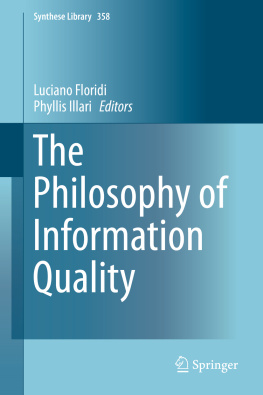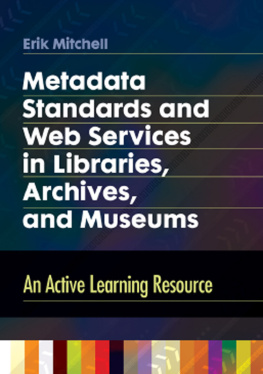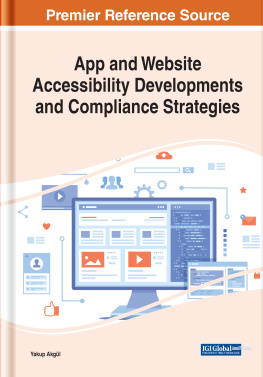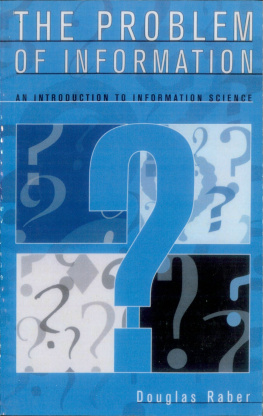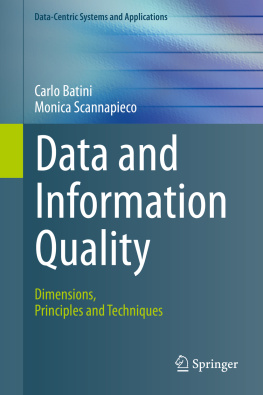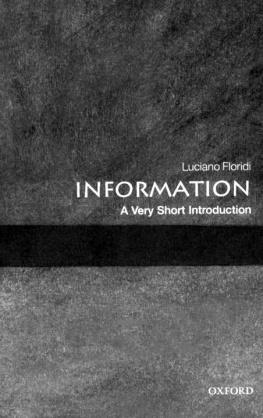1. Introduction
The most developed post-industrial societies live by information, and Information and Communication Technologies (ICTs) keep them oxygenated. So the better the quality of the information exchanged the more likely it is that such societies will prosper. But what is information quality (IQ) exactly? This is a crucial and pressing question but, so far, our answers have been less than satisfactory. Here are two examples.
In the United States, the Information Quality Act , also known as the Data Quality Act, enacted in 2000 ( ).
In the UK, some of the most sustained efforts in dealing with IQ issues have concerned the health care system. Already in 2001, the Kennedy Report ( http://goo.gl/uhFRgk ) acknowledged that: The assessment of the performance of clinicians and information for the benefit of patients depend on the collection, analysis and dissemination of data. However, in 2004, the NHS Information Quality Assurance Consultation ( http://tinyurl.com/mm6qbxh ) still stressed that Consideration of information and data quality are made more complex by the general agreement that there are a number of different aspects to information/data quality but no clear agreement as to what these are.
Lacking a clear and precise understanding of IQ standards (such as accessibility, accuracy, availability, completeness, currency, integrity, redundancy, reliability, timeliness, trustworthiness, usability, and so forth) causes costly errors, confusion, impasse and missed opportunities. Part of the difficulty lies in putting together the right conceptual and technical framework necessary to analyse and evaluate IQ. Some steps have been taken to rectify the situation. The first International Conference on Information Quality () have addressed applied issues, plausible scenarios and the codification of best practices. So there is a wealth of available results that could make a difference. However, such results have had limited impact because research concerning IQ has failed to combine and cross-fertilise theory and practice. Furthermore, insufficient work has been done to promote the value-adding synthesis of academic findings and technological know-how. Within this context, the research project Understanding Information Quality Standards and their Challenges funded by the Arts and Humanities Research Council in the UK during the academic years 201112 and 201213 sought to bridge the gap between theoretically sound and technologically feasible studies. A primary goal was to apply current investigations in the philosophy of information to the analysis and evaluation of information quality, by combining them with the technical expertise in information management offered by Google UK, a partner in the project.
Initially, the aim was to deliver a white paper on IQ standards that would synthesise conceptual and technological expertise on the challenges posed by the analysis of IQ, address the critical issues that affect the life-cycle (from creation to use) of high IQ, and enable us to share the conceptual and technical understanding of the new challenges posed by ICTs with respect to the identification and evaluation of high IQ resources, in view of creating a conducive environment for exchanges of results on IQ standards. The outcome exceeded our initial expectations. The project succeeded in bridging different communities and cultures that, so far, had failed to interact successfully, leading to a sharing of knowledge that may have a significant and lasting impact on IQ standards. Despite the potential challenges represented by different methodologies, technical vocabularies and working cultures, it soon became clear that more could be achieved, thanks to the fruitful collaboration of many experts, who generously contributed their knowledge, time, and research. A series of successful and fruitful meetings led to a more ambitious outcome, namely this book.
The contents of the specific contributions are discussed in the first chapter, where we provide an overview of the field of IQ studies and of how the remaining chapters fit within it.
Here, we would like to highlight the fact that we hope the completion of this project will contribute to enhancing Googles capacity to deliver information that measures up to the high standards expected by its users. The impact of the project should foster both good practices in IT management and better design principles favouring IQ among internet service providers. The project should also benefit policy-makers seeking to improve IQ standards and the delivery and effectiveness of public information services. We shall be delighted if the project raises users awareness on the issues affecting the value and reliability of online information, and encourage a more responsible production, usage, and sharing of digital resources. We need to increase the number of people using and trusting information online, and hence enjoying its cultural and social benefits. For this purpose, IQ can deliver huge benefits to the quality of life and health, insofar as they both depend on improvements in the management of IQ issues. Thus the project may help to empower users, by offering them the framework necessary to evaluate the quality of the information they access. Finally, we offer the results of this project to all those researchers working on availability, accessibility and accountability of information; on the philosophy of information; on information management; and on data quality auditing systems. We hope that the delivered analysis will further improve our understanding of what features contribute to improve the quality, and hence usability, of information.
References
Al-Hakim, L. (2007). Information quality management: Theory and applications . Hershey: Idea Group Pub.
Congressional Report Service. (2004). Report for congress, the information quality act: Ombs guidance and initial implementation . http://tinyurl.Com/nbbtj47
Gasser, U. (Ed.). (2004). Information quality regulation: Foundations, perspectives, and applications . Baden-Baden/Zurich: Nomos/Schulthess.
Huang, K.-T., Lee, Y. W., & Wang, Y. R. (1999). Quality information and knowledge . London: Prentice-Hall.
Lee, Y. W., Pipino, L. L., Funk, J. D., & Wang, R. Y. (2006). Journey to data quality . Cambridge, MA: MIT Press.
Redman, T. C. (1996). Data quality for the information age . Boston: Artech House.
Tozer, G. V. (1994). Information quality management . Oxford: Blackwell.
United States Government Accountability Office. (2006). Information quality act: Expanded oversight and clearer guidance by the office of management and budget could improve agencies implementation of act: Report to congressional requesters . Washington, DC: U.S. Govt. Accountability Office.
Wang, Y. R., & Kon, H. B. (1992). Toward quality data: An attributes-based approach to data quality . Cambridge, MA: MIT Press.
Wang, R. Y., Pierce, E. M., Madnik, S. E., Zwass, V., & Fisher, C. W. (Eds.). (2005). Information quality . Armonk/London: M.E. Sharpe.

